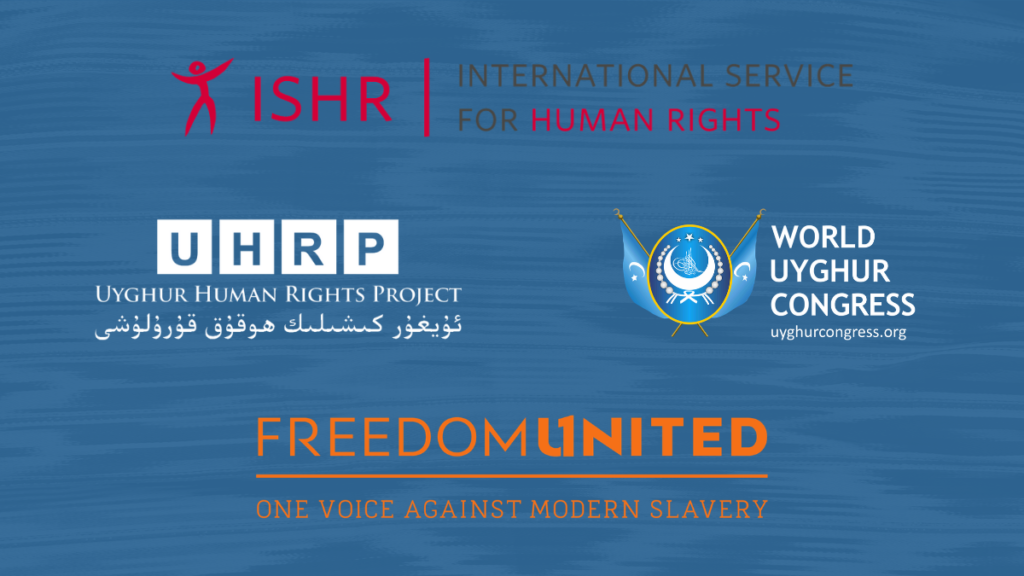Civil society groups welcome action by UN human rights experts to address forced labour in Uyghur region

March 30, 2021
A group of more than 16 independent UN human rights experts have sent a letter to Chinese and multinational companies, raising deep concerns about ‘the alleged arbitrary detention and forced labour’ of Uyghur Turkic Muslims. The letter was in response to information that connected over 150 domestic Chinese and foreign-domiciled companies to serious allegations of human rights abuses against Uyghur workers.
In a press release on 29 March, the experts cite ‘exploitative working and abusive living conditions that may constitute arbitrary detention, human trafficking, forced labour and enslavement by the use of forced labour’ which have been documented also by Uyghur rights groups, labour groups and non-governmental organisations, in workplaces both within and outside of the Uyghur Region.
‘With this statement, the UN experts have made it clear that businesses with ties to the Uyghur Region may be implicated in forced labour and other abuses against Uyghurs,’ said Anti-Slavery International’s Chloe Cranston.
‘Given the impossibility of due diligence on the ground in the Region, responsible business conduct means that businesses, including global apparel brands, must cut all ties to the Uyghur Region and Uyghur forced labour – and civil society groups have issued a Call to Action to guide businesses in doing that.’
The experts note that such allegations may indicate grave human rights violations, and that, regardless of how the Chinese government may justify its ‘re-education’ and ‘poverty alleviation’ programmes, authorities should ‘immediately cease any such measures that are not fully compliant with international law, norms and standards relating to human rights, including the rights of minorities.’
Central to the ability of businesses to conduct meaningful due diligence is the question of access. The experts, and many other observers, note that there is currently not a ‘conducive’ environment’ for businesses who want—and in many cases are obligated—to carry out supply chain audits.
The UN experts’ letter was also sent to the Chinese government, as well as to governments where multinational brands are domiciled.
‘The UN Guiding Principles are clear that governments should be taking steps to ensure human rights due diligence is undertaken by companies domiciled within their jurisdictions’, says Omer Kanat, the executive director of the Uyghur Human Rights Project.
‘For this reason, efforts by the US, Canada and UK governments to ensure that goods produced by forced Uyghur labour are not imported are helpful steps, as are binding regulations like the anticipated EU mandatory human rights due diligence.’
The UN experts highlight that ‘unfettered access’ to the country, and specifically the Uyghur Region, is essential for conducting fact-finding missions and for companies to be able to scrutinise their supply chains, ensuring respect for human rights.
Negotiating access for officials and experts has been high on the agenda of the UN, with governments urging China to open the region to scrutiny, and Secretary-General Guterres pledging his support for a visit ‘without restrictions or limitations’ by human rights chief Michelle Bachelet.
Sarah M Brooks, programme director at ISHR, acknowledges that this is an important push.
‘Civil society groups continue to demand – and Bachelet’s office has been clear – that any visit must meet minimum conditions for transparency and independence, which the Chinese government has thus far appeared unwilling to accept’.
Over the past year, no other UN agency or high-level official has spoken out about the repression of Uyghurs.
Zumretay Arkin, Program & Advocacy Manager at the World Uyghur Congress says that Uyghur groups have been urging the International Labour Organisation (ILO) to break its silence. ‘With the UN’s human rights experts now having spoken out, the ILO needs to step up as well. The forced labour of Uyghur and Turkic people in the Uyghur Region and elsewhere in China can no longer be ignored. It falls directly under the responsibility of this international body that was founded to protect and promote workers’ rights around the world.’
The Chinese government committed to respect and realise the prohibition of forced labour under the 1998 ILO Declaration on Fundamental Principles and Rights at Work; however, it has not ratified the ILO core conventions, and critics say that promises of ‘continued and sustained efforts’—as, for example, stated in the EU-China investment agreement—far fall short of needed action.
This statement was endorsed by Freedom United, the International Service for Human Rights, Uyghur Human Rights Project and World Uyghur Congress.
